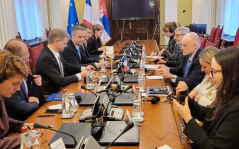National Assembly of the Republic of Serbia / Activities / Activity details

15 March 2023 The participants of the meeting
Wednesday, 15 March 2023
Foreign Affairs Committee Chairman Meets with Members of French National Assembly
The Chairman of the Foreign Affairs Committee Borko Stefanovic and Committee member Jovan Palalic met today with the Frédéric Petit and Marine Hamelet, members of the Foreign Affairs Committee of the National Assembly of the Republic of France, currently in official visit to the Republic of Serbia.
Borko Stefanovic thanked France for its support in the efforts to make Serbia a member of the EU as soon as possible, as well as to resolve the Kosovo-Metohija issue. Stefanovic added that France provides a great stimulus to Serbia’s the economic development through investments and companies operating in Serbia.
He pointed out that Serbia, as well as the entire region, has a place in Europe, that it belongs there geographically, historically, culturally, economically and security-wise and that it is important for the EU to give more specific signals and dates for the region’s European perspective. If the Balkans remains outside the European trends, the instability of the region will continue and this will affect Europe itself, Stefanovic said.
The Chairman of the Foreign Affairs Committee also pointed out that it is essential to solve the open problems in Kosovo-Metohija as soon as possible and end the frozen conflict. He opined that the good side of the "European plan", as a solution proposed for the normalisation of relations, is the stipulated obligation to set up the Community of Serb Municipalities, as the guarantor of the survival of Serbs in Kosovo-Metohija. It is also good that the plan does not envisage mutual recognition, said Borko Stefanovic, but that it cannot be acceptable for Serbia to enable Kosovo's membership in the UN, which is provided for in item 4. "Serbia should be left with the possibility to retain its sovereign right to vote against Kosovo's membership in the UN and thus preserve his national dignity", emphasised Stefanovic.
Jovan Palalic pointed out that the specific position of Serbia in this complex moment and the circumstances of the war in Ukraine require greater understanding. EU membership is Serbia's strategic priority, as is the protection of the country's territorial integrity and sovereignty, said Palalic. He added that research shows that 80% of Serbian citizens are against the recognition of the independence of so-called Kosovo, but that the same percentage of citizens are against EU membership as well, if the recognition of said independence is a precondition for membership.
Palalic said that it is vital for the EU to provide Serbia with a more concrete membership perspective because the political demands placed before our country, obscure all the positive effects of European integration and all the support we have from the EU for the citizens. It is precisely in these specific circumstances, that France can play a big role, as a traditional and historical friend to Serbia, he stressed. Through greater economic presence and cultural ties, France can contribute to a greater change in the mood of the Serbian people towards the EU, which it perceives through constant political pressures, Jovan Palalic said.
Speaking about Kosovo-Metohija, Palalic pointed out that Serbia's positions there are clear, that it defends its territorial integrity written in the Constitution and Resolution 1244 and therefore there any idea of recognition is out of the question. Also, the Community of Serb Municipalities must be formed before any further agreements between Belgrade and Pristina, he pointed out.
Regarding the introduction of sanctions against Russia, Jovan Palalic stated that Serbia defends its economic interests and does not want to impose these. He added that having had them imposed on itself as the only country in Europe is why the entire nation is against this type of policy.
Marine Hamelet and Frédéric Petit stressed that the Balkans have not been forgotten due to the war in Ukraine. The Balkans are the future of Europe, in terms of building the EU model in the Balkans, just as the EU is the future of this region, Petit said.
The officials agreed that parliamentary diplomacy, through the fostering ties and constant communication between the elected representatives of the citizens is of great importance and that the good trend of interparliamentary cooperation between Serbia and France should be continued, especially through the exchange of visits of delegations of the two parliaments’ foreign affairs committees.




